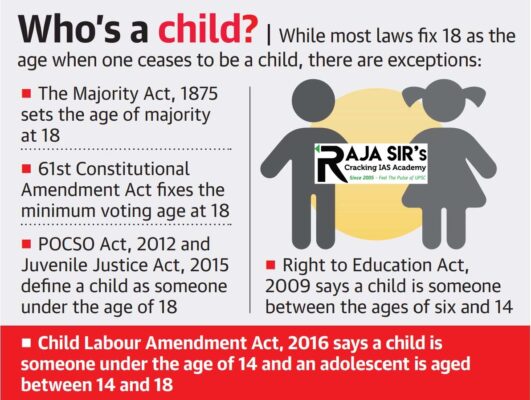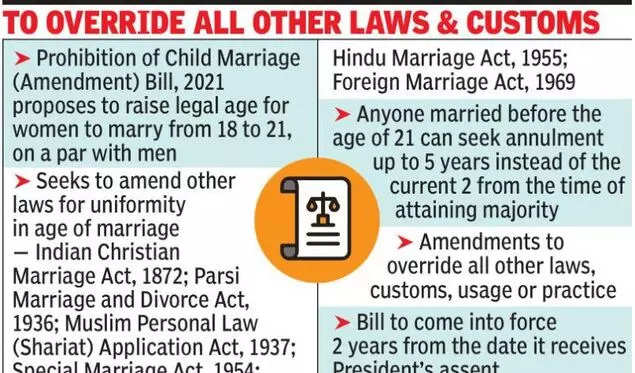- Home
- Prelims
- Mains
- Current Affairs
- Study Materials
- Test Series
What are the legal implications of enforcing age of marriage?.
The Union Cabinet has cleared a proposal to raise the minimum marriage age for women from 18 to 21. A look at the legal implications:
Personal laws that govern marriage and other personal practices for communities prescribe certain criteria for marriage, including age of the bride and groom. For example, Section 5(iii) of The Hindu Marriage Act, 1955, sets a minimum age of 18 for the bride and 21 for the groom. This is the same for Christians under the Indian Christian Marriage Act, 1872 and the Special Marriage Act.
For Muslims, the criterion is attaining puberty, which is assumed when the bride or groom turns 15.
Essentially to outlaw child marriage. This is done through special legislation such as the Prohibition of Child Marriage Act, 2006 and the Protection of Children from Sexual Offences Act, 2012. Under the Child Marriage Prevention Act, any marriage below the prescribed age is illegal and the perpetrators of a forced child marriage can be punished.
Child marriages are illegal but not void. It is voidable at the option of the minor party. This means the marriage can be declared void by a court only if the minor party petitions the court. This flexibility is kept to ensure that the rights of the minor, especially the girl, is not taken away in marital homes later on.
However, if a court finds a minor was coerced into marriage by parents or guardians, the provisions of the Juvenile Justice (Care and Protection of Children) Act come into effect to keep the custody of the minor until he or she attains majority and can make a decision on the marriage.
First, the age limit in the Prohibition of Child Marriage Act will have to be changed. The government had indicated this will be followed by necessary changes in personal law. The Hindu Marriage Act, the Indian Christian Marriage Act and the Special Marriage Act will also have to be changed consequently. However, changes in the Muslim law could raise significant legal issues.
What are these legal issues?
The Prohibition of Child Marriage Act does not contain any provision that explicitly says the law would override any other laws on the issue. And there is an obvious discrepancy in the letter of the law between the Prohibition of Child Marriage Act and Muslim law on the minimum age of marriage.
For example, although the marriage of a 16-year-old girl deemed to have attained puberty is not considered invalid in Muslim law, it would be a child marriage under the Prohibition of Child Marriage Act.
Additionally, the Supreme Court, in a landmark 2017 verdict, has held that in case of a minor wife, the law recognises marital rape. Husbands of minor women, as opposed to husbands of adult women, cannot enjoy the blanket immunity that the Indian Penal Code provides in Exception 2 to Section 375 against charges of marital rape. But if a marriage is valid, can a marital rape claim still be made by the minor wife? Experts have noted that this is a blind spot in the law that needs to be rectified.
 Muslim law is a mere codification of Shariah law.
In Shayara Bano v Union of India, the case in which the Supreme Court declared the practice of instant triple talaq as unconstitutional, one of the key questions was whether the Supreme Court could quash a religious or divine law. The court said all personal laws will have to fall under the constitutional framework and will be subject to public order, morality and health.
Experts suggest the minimum age of marriage can be justified under public health. However, there are several differing verdicts from high courts on this issue.
What have courts said so far?
In February this year, the Punjab and Haryana High Court granted protection to a Muslim couple (a 17-year-old girl married to a 36-year-old man), holding that theirs was a legal marriage under personal law. The HC examined provisions of the Prohibition of Child Marriage Act but held that since the special law does not override personal laws, Muslim law will prevail.
In other cases, the Karnataka and Gujarat High Courts have held that the 2006 special law would override personal laws and have sent the minor girl to a care facility.
Muslim law is a mere codification of Shariah law.
In Shayara Bano v Union of India, the case in which the Supreme Court declared the practice of instant triple talaq as unconstitutional, one of the key questions was whether the Supreme Court could quash a religious or divine law. The court said all personal laws will have to fall under the constitutional framework and will be subject to public order, morality and health.
Experts suggest the minimum age of marriage can be justified under public health. However, there are several differing verdicts from high courts on this issue.
What have courts said so far?
In February this year, the Punjab and Haryana High Court granted protection to a Muslim couple (a 17-year-old girl married to a 36-year-old man), holding that theirs was a legal marriage under personal law. The HC examined provisions of the Prohibition of Child Marriage Act but held that since the special law does not override personal laws, Muslim law will prevail.
In other cases, the Karnataka and Gujarat High Courts have held that the 2006 special law would override personal laws and have sent the minor girl to a care facility.

 Muslim law is a mere codification of Shariah law.
In Shayara Bano v Union of India, the case in which the Supreme Court declared the practice of instant triple talaq as unconstitutional, one of the key questions was whether the Supreme Court could quash a religious or divine law. The court said all personal laws will have to fall under the constitutional framework and will be subject to public order, morality and health.
Experts suggest the minimum age of marriage can be justified under public health. However, there are several differing verdicts from high courts on this issue.
What have courts said so far?
In February this year, the Punjab and Haryana High Court granted protection to a Muslim couple (a 17-year-old girl married to a 36-year-old man), holding that theirs was a legal marriage under personal law. The HC examined provisions of the Prohibition of Child Marriage Act but held that since the special law does not override personal laws, Muslim law will prevail.
In other cases, the Karnataka and Gujarat High Courts have held that the 2006 special law would override personal laws and have sent the minor girl to a care facility.
Muslim law is a mere codification of Shariah law.
In Shayara Bano v Union of India, the case in which the Supreme Court declared the practice of instant triple talaq as unconstitutional, one of the key questions was whether the Supreme Court could quash a religious or divine law. The court said all personal laws will have to fall under the constitutional framework and will be subject to public order, morality and health.
Experts suggest the minimum age of marriage can be justified under public health. However, there are several differing verdicts from high courts on this issue.
What have courts said so far?
In February this year, the Punjab and Haryana High Court granted protection to a Muslim couple (a 17-year-old girl married to a 36-year-old man), holding that theirs was a legal marriage under personal law. The HC examined provisions of the Prohibition of Child Marriage Act but held that since the special law does not override personal laws, Muslim law will prevail.
In other cases, the Karnataka and Gujarat High Courts have held that the 2006 special law would override personal laws and have sent the minor girl to a care facility.










 Latest News
Latest News
 General Studies
General Studies